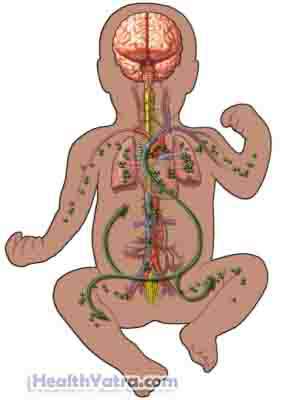Definition
Septic shock is a condition in which blood pressure falls dangerously. It may occur in patients with serious infections. Very low blood pressure will slow blood flow. Organ failure may occur if the blood flow is too low.
Causes
Septic shock is caused by sepsis. Sepsis can be triggered by many different kinds of infections including:
- Bacterial
- Viral
- Parasitic
- Fungal infections

Risk Factors
The following factors increase your chance of septic shock:
- Age: newborns and people over age 50
- Weakened immune system
- Low white blood cell counts
- Chronic diseases
- Previous surgery
Symptoms
If you experience any of these do not assume it is due to septic shock. These symptoms may be caused by other, less serious health conditions. If you experience any one of them, see your doctor.
- Confusion
- Reduced alertness
- Irregular blood pressure
- Chills
- Fever, which may be followed by a drop in body temperature
- Warm, flushed skin
- Rapid, pounding heartbeat
- Rapid breathing
- Reduced urination
- Kidney failure
- Lung failure
- Heart failure
- Blood clots
Diagnosis
Your doctor will ask about your symptoms and medical history. A physical exam will be done. Tests may include the following:
- Blood tests to measure white blood cells, oxygen levels, platelet count, lactic acid, and metabolic waste
- Blood tests and cultures to check for infectious organisms
- Electrocardiogram (ECG)—to check for heart rhythm irregularities
Treatment
Talk with your doctor about the best plan for you. Treatment options include the following:
Supportive Measures for Shock
If you have septic shock, you will be admitted to the intensive care unit. There you will be given:
- IV fluids—delivered directly into a vein
- Drugs to increase blood flow
- Extra oxygen
If your lungs fail, you may be put on a mechanical ventilator. It will help you breathe. Other therapies or supportive measures may be used.
Medications
Once the cause of the infection is identified, you will be given high doses of one or more antibiotics.
Surgery
Surgery may be performed to remove any dead tissue.
Prevention
Most cases of septic shock cannot be prevented. Treating bacterial and other infections promptly may help.
